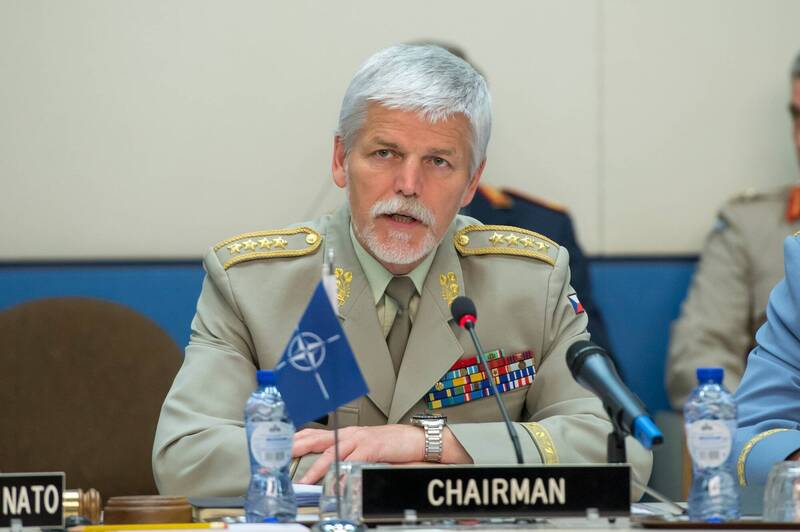General Petr Pavel, the Czech presidential candidate, served as Chairman of the North Atlantic Treaty Organization (NATO) Military Council (CMC) from 2015 to 2018, and his position is second only to NATO Secretary-General.
(taken from Pavel Facebook)
[Reporter Yang Chengyu/Taipei Report] The term of Czech President Miloš Zeman is coming to an end, and the Czech Republic will hold the first round of voting in the presidential election in the middle of next month.
Among them, the pro-China former Prime Minister Andrej Babiš is regarded as Zeman's successor, and the polls temporarily have the upper hand; General (Petr Pavel) and economics professor Danuše Nerudová (Danuše Nerudová), two independent candidates, are hot on their heels.
Pavel said bluntly that China is by no means a friendly country to the Czech Republic; he does not think China will be an important economic partner of the Czech Republic, but should maintain economic and trade relations with Taiwan and other countries.
The first round of the Czech presidential election is expected to be staged with a "three-legged supervisor". The polls are Babis, Pavel, and Neludova in turn. The support of the three falls between 25% and 30%. If no one can win the first round , the candidates with the top two most votes will enter the second round of the run-off.
Pavel Fischer, Chairman of the Foreign Affairs, Defense and Security Committee of the Czech Senate, which is friendly with Taiwan, currently ranks fourth in polls.
Please read on...
In a recent interview with Czech media E15, he was asked what it means to pursue a more active foreign policy when announcing his candidacy. Pavel, who served as the Chief of Staff of the Czech Republic from 2012 to 2015, responded that the Czech Republic needs to take a more active approach and be more cooperative with its allies. There is still a lot of room for effort in coordinating foreign policy and making good use of one's own membership in the EU and NATO to put forward more specific suggestions instead of just criticizing.
As for Russia's attitude, Pavel pointed out that a collapse of Russia is definitely not in the interests of all parties. Russia's nuclear arsenal is still a considerable risk, and the EU cannot afford the consequences of Russia's complete destruction of stability.
Therefore, we must act very cautiously and decisively with Russia, and this requires concerted action with our allies.
On the one hand, it is necessary to clarify to Russia that the West will never accept blackmail by means of nuclear weapons; on the other hand, it must also be made clear that if Russia is willing to act in a manner that abides by international law, the West is also ready to take constructive actions in response.
When asked about the fact that current President Zeman is "famous" for his visits to China, Pavel bluntly said that he strongly disagrees with Zeman's approach in matters related to China.
He mentioned that when he served as the chief of staff of the Czech Republic in 2012, he had already warned that Russia was a potential threat; when he became the chairman of the NATO Military Commission in 2015, he also warned that China would become a major security challenge and possible threat. China is listed as a security risk this year.
Pavel emphasized that for the Czech Republic, China will never be a friendly country. The values of the two countries are completely different, and they are not based on the same foundation, and their strategic goals are also very different.
He believes that the Czech Republic must open up to China, but it must adopt a cautious attitude; China uses a "divide and conquer" approach, so the Czech Republic must coordinate with its allies and other democratic countries and act together.
After all, the Czech Republic is a relatively small political entity and cannot compete with China's powerful economic, financial and technological power.
However, Pavel also agrees that from a commercial point of view, China is indeed a partner. He does not agree with restrictions on economic and trade diplomacy, although so far the so-called "economic and trade diplomacy" of the Czech Republic has been related to large companies or businessmen close to Zeman. .
Potential enterprises, SMEs and start-ups should also participate.
Pavel reiterated that the Czech Republic should not try to formulate economic policy alone, as the economy is not strong enough to be defended properly.
The Czech Republic should consider establishing closer partnerships with other stronger EU countries, which will be more beneficial. The trade volume between the Czech Republic and China is not so large that the Czech Republic must change its principles of international relations for this purpose; for the Czech Republic, it should be well Maintain relationships with other markets, such as Taiwan.
In addition, in another E15 interview, when asked what kind of relationship the Czech Republic should maintain with China, Nerudova responded that, as the head of state, she will definitely defend the security and freedom of the Czech Republic, and will not neglect the relationship between Russia and China. China threat.
China must be treated with caution, and its influence cannot be underestimated.
We have all seen over the years how China has actively intervened in European affairs for its own benefit and strengthened its presence in Africa.
We must not repeat the same mistakes in our dealings with China, and it is of the utmost importance to defend the rights, security and sovereignty of the Czech Republic.
